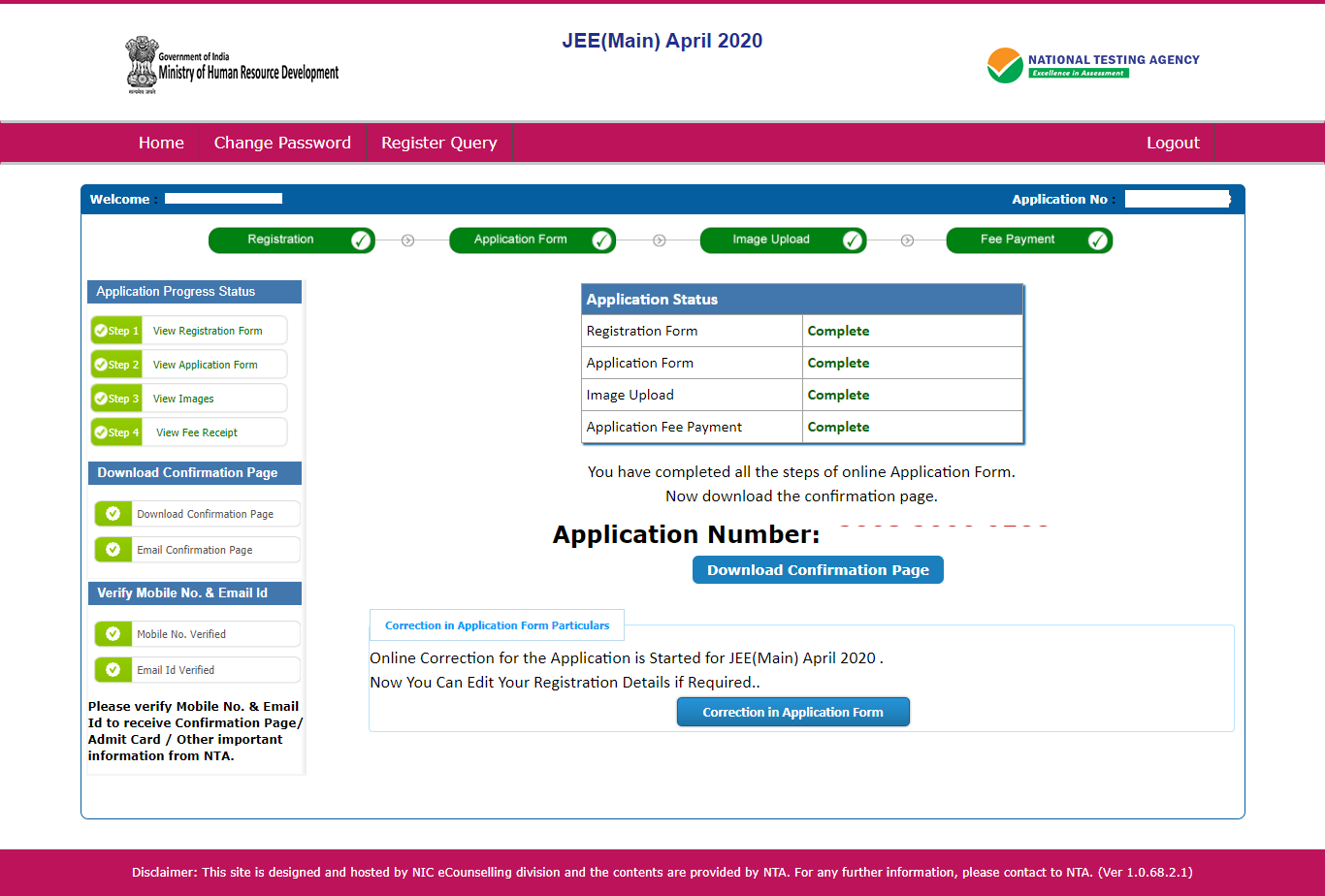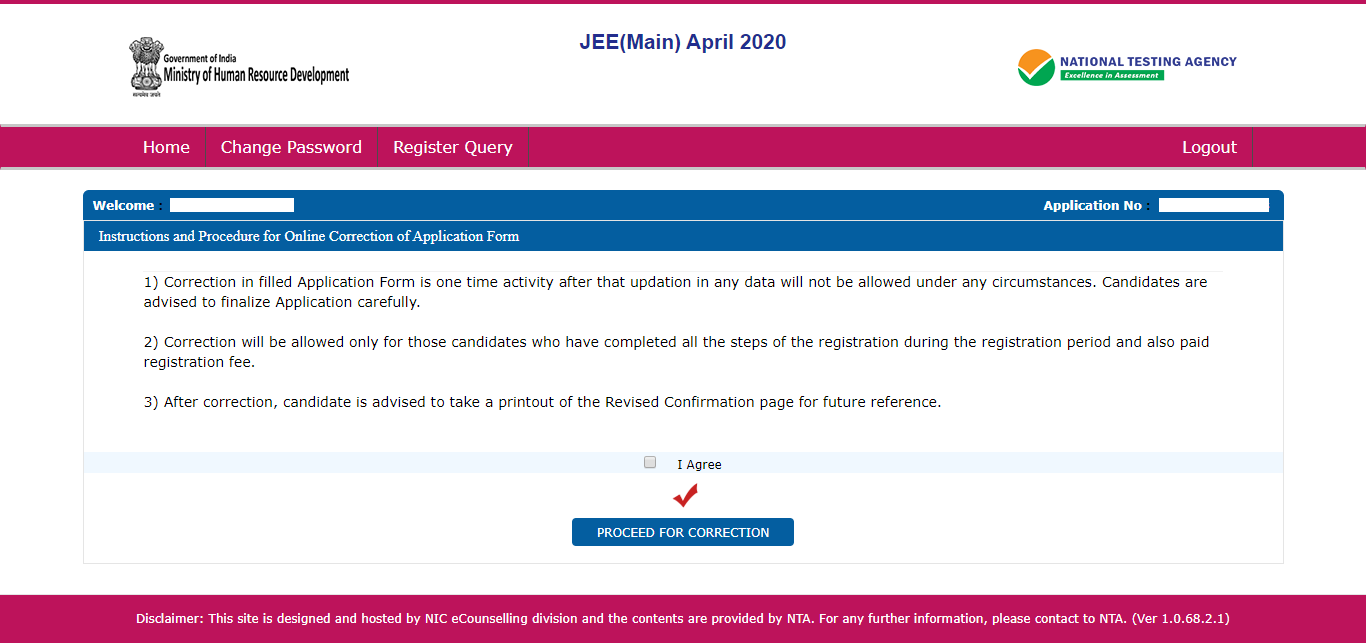Amity University-Noida B.Tech Admissions 2026
Among top 100 Universities Globally in the Times Higher Education (THE) Interdisciplinary Science Rankings 2026
How to change JEE Main 2026 Exam Centres - The National Testing Agency will allow applicants to change their JEE Main exam centre preference during the application form correction process only. The link to change the JEE Main 2026 exam centre will be available at jeemain.nta.ac.in. Candidates can change their JEE Main exam centre 2026 through the JEE Main 2026 form correction window. To make the changes in the JEE Mains 2026 exam centres/exam cities, the candidates will be required to log in using their JEE application number and password. No candidate can change their allotted exam centre after the JEE Main form correction. Candidates can check their exam date and city for the JEE Mains exam online. The exam centre will be mentioned in the JEE Main city slip. However, the complete exam centre address will be mentioned on the JEE Main 202 admit card.

The authority will open the form correction window option after the conclusion of the JEE Mains 2026 registration process. Candidates can modify their JEE Main 2026 exam centre through the JEE Mains login portal. Check how to change the exam centres of JEE Main 2026 through this article. Before making any changes, candidates can review the list of JEE Main 2026 exam centres online. Read the full article to know more about how to change JEE Main 2026 exam centres.
Particulars | January session | April Session |
JEE Main 2026 registration dates | October 31 to November 27, 2025 | Last Week of January to February 2026 |
JEE Main application form 2026 correction facility start date | November, 2025 | April 2026 |
JEE Main 2026 application form correction end date | November, 2025 | April 2026 |
JEE Main exam city initiation slip | First Week of January, 2026 | Second Week of March 2026 |
Release date of JEE Main 2026 admit card | 3 - 4 days before the examination | 3 - 4 days before the examination |
JEE Main 2026 exam date | Between January 21 and 30, 2026 | Between April 2 and 9, 2026 |
Official website | jeemain.nta.ac.in | jeemain.nta.ac.in |
Required login credentials |
|
|
Colleges Accepting JEE Main Scores
Among top 100 Universities Globally in the Times Higher Education (THE) Interdisciplinary Science Rankings 2026
Last Date to Apply: 28th Feb | Ranked #43 among Engineering colleges in India by NIRF | Highest Package 1.3 CR , 100% Placements
Candidates can change their previously selected exam cities/centres through the JEE Main 2026 correction facility provided by the NTA. No additional fees will be charged by the candidates for making the changes. The given steps can be referred to change JEE Main exam centres 2026.

Candidates will have to read the instructions, check on ‘I Agree’, and click on ‘Proceed for Correction’.
Recognized as Institute of Eminence by Govt. of India | NAAC ‘A++’ Grade | Upto 75% Scholarships
98% Placement Record | Highest CTC 81.25 LPA | NAAC A++ Accredited | Ranked #62 in India by NIRF Ranking 2025 | JEE & JET Scores Accepted

The candidates will next have to select their new preferred cities.

Click on all of the particulars, and 'I agree' and the final submission has to be done.
If the candidates forget their IIT JEE Main 2026 application form number, then the following steps have to be undertaken:
Frequently Asked Questions (FAQs)
Candidates can check the JEE exam centre during the JEE Mains application form correction process.
No, JEE Main shift is assigned by the NTA.
The dates for the JEE Main correction window are yet to be announced online.
No, candidates cannot change the JEE Main 2026 exam centre anytime. The option to modify the exam centre will only be available during the correction window.
Students can visit the official website jeemain.nta.nic.in to check the jee mains 2026 exam cities list.
The National Testing Agency will release the list of jee main exam centre 2026 on their official website.
The last date to edit the JEE Main 2026 exam centre preferences is yet to be announced online.
NTA will allow candidates to change their JEE Main exam centre through the JEE Main application form correction.
To change JEE Main exam centres, candidates had to log in using the application number and password.
To change the exam centre for JEE main exam, applicants need to login using the JEE main login credentials and have to go to the correction in the application form section to select their new JEE main exam centre.
On Question asked by student community
decent chances actually as home state quota seats are 50%. allotments will depend on the JEE rank and not percentile though. in 2025, for female supernumerary it closed at 9286 rank while for open gen it closed at 5573.
So, would advise to use this tool to check the probable
yes you will. Ususally the return is within 7 days i it has failed at the gateway level which it seems to be. Please wait. You will get the money back
Slim chances as in 2025 the closing rank was 118 for SPA Delhi for B.Arch. You will need to wait for the rank list to come in April before getting a better picture. Please check https://engineering.careers360.com/jee-main-college-predictor for the predictions.
Check out https://engineering.careers360.com/jee-main-rank-predictor to know the probable rank
Hi Smita Sharma,
With 47 percentile in JEE Mains 2026, you might get rank around 7,00,000 plus which is very high. Check the link below for the Best engineering colleges available for you based on yours percentile.
Link 1: https://engineering.careers360.com/colleges/list-of-engineering-colleges-in-pune-accepting-jee-main
Hey Abhinav!
You can start your JEE Preparation with ICSE. You can check How to Prepare for JEE Main 2026?- Study Plan and start you preparation.
Among top 100 Universities Globally in the Times Higher Education (THE) Interdisciplinary Science Rankings 2026
Recognized as Institute of Eminence by Govt. of India | NAAC ‘A++’ Grade | Upto 75% Scholarships
70th University Ranked by NIRF | 80th Engineering Rank by NIRF | Accredited by NBA and NAAC A+
Last Date to Apply: 28th Feb | Ranked #43 among Engineering colleges in India by NIRF | Highest Package 1.3 CR , 100% Placements
Highest CTC 44.14 LPA | UGC Approved | 1600+ Recruiters | 100% Placement
NAAC A++ Grade | Recognized as Category-1 Deemed to be University by UGC | 41,000 + Alumni Imprints Globally